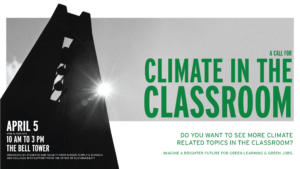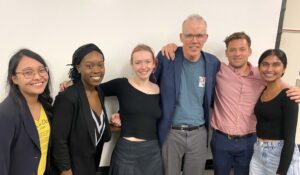Temple University, Climate in Curricula.
Environmental literacy in General Education. Please find background on this topic below. Currently (2025-2026 AY), I am serving on a small committee that, besides myself, includes Hamil Pearsall, Professor of Geography, Environment and Urban Studies, and chair of the committee, and Alix Davatzes, Hazel Tomlinson Associate Professor of Geology in the College of Science and Technology. The General Education (GenEd) Executive Committee agreed to require undergraduate students to take one GenEd course that has content pertaining to Environmental Literacy. Our charge this year is to define environmental literacy, articulate learning objectives that relate directly to GenEd competencies, and develop a rubric that can be used to determine whether a course satisfies delivery of environmental literacy content. In the future, we will use the rubric to evaluate whether existing, revised, or new courses should be assigned the environmental literacy attribute.
Background. Beginning in 2023, I began collaborating with Mohammad Kiani, Professor of Mechanical Engineering, Amy Sinden, I. Herman Stern Professor of Law, and more recently, Marissa Cloutier, Assistant Professor of Social and Behavioral Sciences, to persuade upper administration to integrate climate change content into university curricula. In spring of 2023, Professors Kiani and Sinden and I met with Vice Provost of Strategic Initiatives, Richard Souvenir, and Provost Mandel to present the following three recommendations:
- Require all undergraduate students to learn about climate change via general education.
- Train faculty to integrate climate change into existing classes using the the Piedmont Project
- Create and bolster existing degree and certificate programs that focus on climate change.
Not long after, two events occurred. In the first, Caroline Burkholder, in the Office of Sustainability, and a few faculty colleagues and I organized the April 5 `Climate in the Classroom` event at the Bell Tower (https://events.temple.edu/climate-in-the-classroom-bell-tower-takeover).

In the second, students involved with the Temple Climate Action Coalition organized a conversation with Amani Reid, (2nd from L) Eastern Regional Coordinator at the Pennsylvania Department of Environmental Protection, and Bill McKibben (3rd from Right) about climate change and climate action at the local and national scale.

In spring 2024, we gave three presentations on this topic, beginning with Science, Technology, and Society at Temple University (STS@TU). Following this, we were invited to present to the Educational Programs and Policies Committee (EPPC), a standing committee of the faculty senate charged with reviewing “all academic matters affecting more than one college, whether they originate from administration, faculty or the student senate.” As part of our presentation, we requested that EPPC adopt a resolution that requires climate/sustainability fluency in all curricula at Temple University utilizing best practices in the field and establishing a Climate Change Faculty Task Force under the auspices of the Provost Office to facilitate and coordinate the implementation of this transformation in our curricula. The EPPC adopted a resolution and recommended that we present to the Faculty Senate, which we did on April 17. Due to technical and procedural issues, a motion was not made to adopt the resolution.
During the 2024-2025 academic year, I served as one member of five Temple faculty members on a committee charged with developing a proposal to integrate environmental literacy into Temple’s General Education (GenEd). The work followed a year of review of the GenEd program and was part of a year of reform. Our work included identifying and understanding components of existing GenEd courses that possess environmental literacy content, reviewing literature pertaining to environmental literacy, sustainability, and others similar concepts, and investigating other higher education institutions that have implemented some form of environmental literacy into their GenEd or Core curricula. Part of this work also included understanding and responding to the concerns of other Temple GenEd committees, such as the executive committee and implementation committee. At year’s end, our committee proposed that, with some exceptions (e.g., transfer students), all undergraduate students would be required to complete two courses from a suite of existing GenEd courses that contain environmental literacy content. Moreover, these courses would already satisfy some other GenEd requirement; in other words, a single course could satisfy or count toward two GenEd requirements. In the end, the executive committee accepted a revised proposal that would require undergraduate students to complete one course classified as environmental literacy.
Temple University, Decarbonization
In spring 2022 I joined faculty and students from across Temple University to draft Recommendations for Temple University to Decarbonize. We will continue to elicit representation and evidence of consensus (e.g., statements, petitions, votes and or resolutions from governing bodies) from many of Temple’s 17 schools and colleges as well as from students, alumni, donors, and staff. We have created a Canvas site for internal communication. To date, the following have endorsed the recommendations:
- Tyler School of Art and Architecture Collegial Assembly
- Boyer College of Music and Dance Collegial Assembly
- College of Engineering Collegial Assembly
- College of Liberal Arts Collegial Assembly
- College of Science and Technology Collegial Assembly
- Department of Biology (within College of Science and Technology)
- Student Chapter, American Society of Landscape Architecture
- Temple Climate Action (student organization)
In April 2024, Meredith Hegg, Associate Professor of Instruction in the Department of Mathematics, and I co-authored a 1500-word article entitled Temple Must Decarbonize in the Temple University Faculty Herald. The contents of the article summarize and provide a rationale for the recommendations to decarbonize.
During the 2025-2026 year, I devoted my attention to curricular aspects described above. Temple released the 2025 Sustainability Action Plan, which refers to an Emissions Reduction Plan that began in August with data analysis.
Tyler School of Art and Architecture Climate Action Network! (Tyler CAN!).
Byron Wolfe, Professor of Photography at Tyler, presented a proposal for an ad hoc Climate Action Committee. Wolfe referred to the Temple University Climate Action Plan, which contains a number of goals that vary in the ease with which each can be accomplished. The goals of the ad hoc committee align with the University’s Climate Action Plan and include three phases: 1) to establish a framework for talking; 2) to assess current practices, set goals and plan; and 3) to act.
A motion to make an ad hoc Climate Action Committee of the CA was made, seconded, and approved in the November 20, 2019, Collegial Assembly meeting. The first Tyler Climate Action Meeting occurred on January 10, 2020.
Since then, using data from the Temple Office of Sustainability, I have estimated the carbon emissions associated with Tyler and the Architecture and Environmental Design (AED) building electricity, steam, and natural gas use, as well as waste output for the 2017, 2018, and 2019 fiscal years. Thereafter, I estimated the potential loss of September Arctic Sea Ice, labor productivity loss associated with these emissions, and the number of trees that would be needed to remove the emissions from the atmosphere. Following are the videos of Tyler Art and Architecture Building Emissions Estimations and Ambler Campus Emission Estimations.
I updated emissions estimations for Tyler and AED buildings in fall 2021 to include a full fiscal year of energy and waste during the Covid-19 pandemic. Natural gas and electricity use in the Tyler building for fiscal years (FYs) 20 and 21 dropped. Steam use dropped in FY 20 but rose in FY 21. Use of chilled water remained constant. Use of electricity and chilled water for the AED building decreased slightly, while steam use stayed constant. In sum, even a pandemic, which caused almost a complete transition from in-person to virtual classes, had some, but very little, impact on energy use and consequent emissions in the buildings.
In fall 2021, the Tyler Climate Action Committee transitioned seamlessly from an ad hoc committee of the Tyler Collegial Assembly that is restricted to work conducted within two years to the Tyler Climate Action Network! Tyler CAN! will continue voluntary work without interruption and broaden our participants to include staff, students, and other interested people from outside Tyler. Ongoing projects include the following, in no particular order:
- Fixer Workshops
- Energy and Material Audits in Photo, Glass, and Foundations
- Tyler Art, Architecture Building Carbon Dioxide Emission Estimations
- Heat Response in Nearby Communities
- Tyler Creative Recycling Center and Community Hub
- Tyler Curriculum Inventory and Survey
- Philosophical, Political, and Aesthetic Strategic Actions
- Review and recommendations related to Standing College Committee work: Promotion and Tenure, Merit Advisory, CIRC, and Exhibitions and Public Programs
- Search and review of University precedents for practical actions, philosophical and aesthetic strategies to address the climate crisis.
- Create Tyler CAN Temple Sites web site: Communicate our actions and goals, as well as elicit personal stories, actions, aspirations for actions, and share resources.